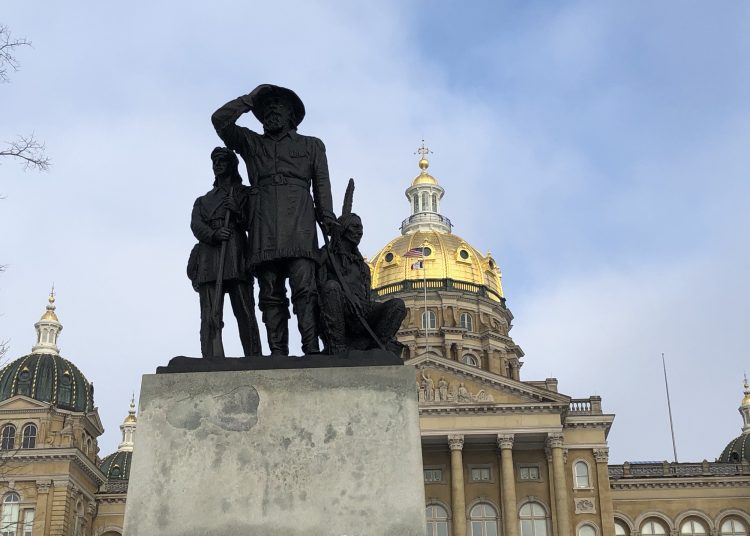DES MOINES, Iowa – An Iowa Senate subcommittee on Thursday advanced a bill, SF 2198, to hold teachers and administrators accountable for knowingly allowing students access to obscene material.
The legislation sponsored by Senate President Jake Chapman, R-Adel, prohibits providing obscene material or hard-core pornography to students from a school library or requiring a student to read or view obscene material or hard-core pornography.
The bill defines “hard-core pornography” as “material depicting patently offensive representations of oral, anal, or vaginal intercourse, actual or simulated, involving humans, or depicting patently offensive representations of masturbation, excretory functions, or bestiality, or lewd exhibition of the genitals, which the average adult taking the material as a whole in applying statewide contemporary community standards would find appeals to the prurient interest; and which material, taken as a whole, lacks serious literary, scientific, political, or artistic value.”
SF 2198 states that any administrator or teacher that knowingly provides said material to students will be guilty of a serious misdemeanor which is punishable by up to one year in jail and a fine between $315 and $1,875.
State Senator Janet Petersen, D-Des Moines, blasted the legislation in her remarks before public comment.
“Knowing Iowans need love and support now more than ever after facing an isolating scary pandemic that has taxed us to our core. But instead, the president of the senate chose to use his opening day speech to pour lighter fluid on a culture war that Iowans don’t want to be a part of,” she said.
“This bill isn’t about protecting our kids. This bill isn’t about improving public schools. This bill is an attack on our kids and Iowans by threatening to put our beloved public school teachers and librarians in prison. This bill is part of an orchestrated attack on Iowa’s public education system,” Petersen added.
Chapman, who spoke at the subcommittee, but was not a member of the subcommittee, had a contentious exchange with Petersen after being invited to explain the bill.
“I worked with you last year to lift the statute of limitations on sexual assault of minors. We had bipartisan support there. I’ve worked with you on numerous issues when it comes to sexual assault. In fact, in 2019, you, along with everyone else, voted to remove the exemption of parents showing kids pornography,” he said, noting that exemption was removed from Iowa Code Chapter 728, the same chapter his bill seeks to amend.
“Every single member, every calling, voted to say it’s not okay for parents to give pornography to their children. We removed that exemption. But yet here today, you say it’s okay for teachers,” Chapman said.
Petersen said Chapman was putting words in her mouth. “I am not going to allow someone to say that I believe in that,” she argued.
Moving onto the bill and stating he withdrew those comments, Chapman said, “This is pornography in our schools. This is sexually explicit material, of oral sex, of oral sex. And to hear individuals advocate, promote and distribute this material to children, as a parent of five children in public schools. And let me just say for the record, we do have wonderful teachers in the state; we have fantastic teachers. That’s why my kids go to public education. But that does not negate those teachers that have advocated and distributed this type of material. And it’s disheartening.”
“This is not okay. Reading books in graphic detail about rape, incest, and pedophilia is not okay. The last thing I should have to worry about sending my daughter or my sons to school is that they’re going to be exposed to pornography in school,” he added.
Education groups opposed the bill.
Melissa Peterson with the Iowa State Education Association said the bill was unnecessary.
“I have to say this piece of legislation appears to be a solution in search of a problem,” she said. “We already have a very clear definition of what constitutes obscene material. We already have severe penalties for education professionals and employees should they happen to violate that existing standard.”
Peterson said that there were already mechanisms through school district policy for parents to address material they find objectionable and can opt their students out.
“We seem to be going out of our way to threaten education professionals. In fact, this bill threatens them with jail, threatens them with financial fines and penalties. We have a real, actual child care in the state of Iowa and this is a distraction, quite frankly, from the real problems we do have in this state,” she added.
Several parents spoke in favor of the bill.
Pam Gronau, a mother with three children in the Urbandale School District, said that she had personal knowledge of parents in ten different school districts who filed reconsideration requests because of material they found objectionable. She said only one book in one school was removed, noting that the books contained material referencing pedophilia, rape, and incest.
“These books are found in schools all over the state of Iowa. A group of us research six different books containing obscene material in 70 different school districts, and 60 out of those 70 schools had at least three of those books,” she said.
Gronau then read an explicit passage from one of those books, The Bluest Eye by Toni Morrison, for the panel.
“This particular book was found in 33 of the schools that I researched,” she said, noting that some of the schools districts had combined middle school/high school buildings that shared a library where sixth-graders could access it.
“Our schools have shown that they will not act on this issue alone, so that’s why we need our legislators to (act). Administrators should be held accountable if they’re going to allow obscene material to our children in our school,” Gronau stated.
Samatha Fett of Carlisle also expressed support for the bill. She recently ran unsuccessfully for school board and said that part of her campaign addressed the book Gender Queer: A Memoir by Maia Kobabe that could be found in the high school library.
She said when the book was found, she thought it would be an “open and shut case” when they asked the school to remove it.
“Instead, we were aced with vilification that we were transphobic, trying to shut down some sort of agenda that, in my opinion, supports pornography. So it was an uphill battle,” Fett said, saying the committee that reviewed it decided to keep the book, and the school board voted 3 to 2 to uphold the review committee’s decision.
“So I’m here because I need you guys to hear this story that we are fighting back at the local level. So we need help because we cannot continue to have pornography in our schools districts,” she added.
A junior from Johnston High School, who supported the bill, read an excerpt from The Absolutely True Diary of a Part-Time Indian by Sherman Alexie, a book she said she was required to read for class, but her principal was unwilling to read out loud because of its explicit description of masturbation.
“If this excerpt makes a middle-aged man too uncomfortable to read in front of a room of adults, how do you think teenage girls feel? We cannot choose to simply not read it like my principal did. It was required,” she said.
Keenan Crow with One Iowa Action, who opposed the bill, read Genesis 19, the story of Lot’s daughters sleeping with him to have children.
“It contains rape. It contains incest. It contains many other difficult subjects. But I think the Bible belongs on school shelves because I don’t think that just because the story is in the Bible that the Bible is about rape, incest, or any of those other things,” he said.
Connie Ryan with Interfaith Alliance of Iowa said she “strongly” opposed the bill.
“Picking and choosing sections and paragraphs out of any book is misleading, whether intentional or not. What this bill is about is targeting teachers and administrators and promoting the propaganda that teachers are to be feared and are the enemy of parents just could not be further from the truth,” she said.
Kathryn Kueter, representing Valor Iowa and Concerned Women for America of Iowa, spoke in support of the bill.
“This legislation is common sense. Schools should not be housing pornographic and obscene material for children to access,” she said.
“No child should be exposed to graphic sexual content, especially content that is normalizing pedophilia as schools are there for learning reading, writing, science, math, not distorting their innocence with sexual perversion,” Kueter added.
Emily Piper with the Iowa Association of School Boards spoke in opposition to the bill.
“I wanted to point out that every school board in the state does adopt policy that allows for review of any instructional material as well as reconsideration and removal of any book. And every school district has a process and a policy to do that. It’s unfortunate that in some cases, folks feel that that process has not worked effectively. And that’s something that certainly we can do a better job of educating our locally elected board members on how to do that,” she said.
Piper pointed out that when books are reviewed for reconsideration, they look at the whole book, not just one excerpt.
“We feel like that process works,” she said.
She also noted that when schools order books for their libraries, they do not purchase them individually, but the books come in large quantities from vendors working from recommendations by the American Library Association.
“There need to obviously be some changes coming from that. And I think as we go through this process, you’ll see more cautious and careful review and asking some questions about material that is in the school library,” Piper said. “But our school boards are not knowingly, willingly trying to inflict pornographic material on our students.”
Courtney Collier, a parent from Waukee, said the bill is not an attack on good teachers.
“We love and appreciate and support our good teachers. In fact, many good teachers support this bill because they want to teach academics free from the equity standards that are being used to defend this material in our school classrooms and libraries,” she said. “This bill holds school boards, administration and rogue teachers, the very rare teacher, who would actually defend teaching sexually explicit, pornographic, and other inappropriate materials to students without parent permission.”
After hearing from numerous speakers for over an hour, the subcommittee members provided their closing comments.
Petersen thanked those who spoke but still opposed the bill.
“I trust our librarians and our educators to make decisions on content that our kids have access to. Parents still always have a role in public school districts to be a part of the process,” she said.
State Senator Jason Schultz, R-Schleswig, spoke in support of the bill.
“Parents are supposed to have a part in this process, but it looks to me like the process is locking them out saying that we know better, we will impose on your children the books that we want because we’re more highly educated. I don’t know that they’re more highly educated. I do know that the parents have the last, final, most serious say, and they’re being denied that,” he said.
State Senator Brad Zaun, R-Urbandale, also voted to support the bill.
“As someone that is married to a former Des Moines public school teacher, I can assure you 99 percent of the teachers in the state of Iowa are great teachers. We have the best teachers in the United States in Iowa,” he said, noting that much of the testimony from public education groups talked about the system and review process but barely mentioned parents.
“This is about parents. I think we learned a lesson in Virginia. Parents stood up and said they’ve had enough. We’ve had a lot of discussions down here about curriculum (allowing) parents to have at least review curriculum being taught to their kids. Well, what happened? What changed? Well, it’s called COVID. And parents started paying attention because they were at home and they were on their computer and seeing what’s going on in the classrooms,” Zaun said.















